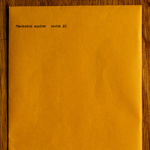|
|
 |
Dusted Reviews
Artist: Frederick Squire Album: March 12 Label: Blue Fog Review date: Mar. 24, 2011 |

|
|
|
 |
A ghostly aura hangs around Frederick Squire’s “You Sing High and We Will Sing High,” the loveliest and best of this solo debut’s 10 songs. It’s in the piano, its oddly echoing notes sounding as if they come not just from another room, but a barely remembered time. It’s in the smoke-ring harmonies that curl in wreathes around Squires whispery vocals. And it’s in the melody itself, which lofts upward weightlessly, wafting up in octave-size leaps, without a hint of physical strain. The song itself is simple, sparsely arranged for piano, guitar and voice and closely tied to traditions like folk, gospel and blues. Yet, it seems to transcend this simplicity, opening a door into a strange, haunted landscape.
March 12 started life as a seven-song EP, sold only at shows by the New Brunswick songwriter who is, perhaps, best known for his 2008 collaboration with Julie Doiron and Phil Elverum of Mount Eerie, Lost Wisdom. He’s also a member of Shotgun & Jaybird and Calm Down It’s Monday, worked on Doiron’s last album and partnered with her and Attack on Black’s Daniel Romano on the 2009 record Daniel, Fred & Julie. The EP made its way to Blue Fog’s Rick White (like Doiron, ex- of Eric’s Trip), who put out the current expanded, re-mastered version late last year.
The songs are fascinating in the way that they bend old forms to new (and even new age) sensibilities. For instance, when Squire writes a song called “The Future of Tradition,” he stands the murder ballad on its head, allowing a slain husband to console his wife before she hangs for his death. A gorgeous, surreal string of verses capture their dialogue, he forgiving, she anxious to see him again. The matter of what she actually did to cause their predicament is never mentioned, and he doesn’t seem eager for revenge. “Frankie, over here you just create yourself,” he sings, “whatever you want to be,” when asked if her sins will be washed clean. It’s a long way from the Old Testament’s eye for an eye.
There’s also a strong element of environmentalism in these songs, in the folk traditional “Pretty Bird,” which finds a power company line-man sorry that he’s cut down the trees that the local birds populate and, most particularly, “It’s in the Water.” This quiet song, embellished like “You Sing High” in the softest sorts of harmonies, asks “Did you foul the water that floats so freely / poisoning the rivers and destroying the hills?”
Yet mostly, what you’re left with is the thread of spirituality that runs all through March 12, an album on which the dead speak softly to the living and tradition bends into surreal shapes. Familiar elements — jangled folk-blues guitars, gospel pianos, old-time harmonies — coalesce in dream-like intensity. There’s an echo at the back of this recording that sounds like an empty room with a door hanging open, a pathway to who knows where. Very few albums are this simple, beautiful and strange.
By Jennifer Kelly
|







